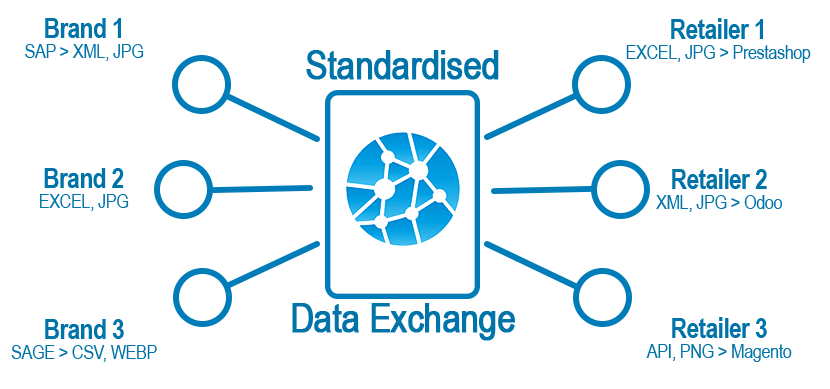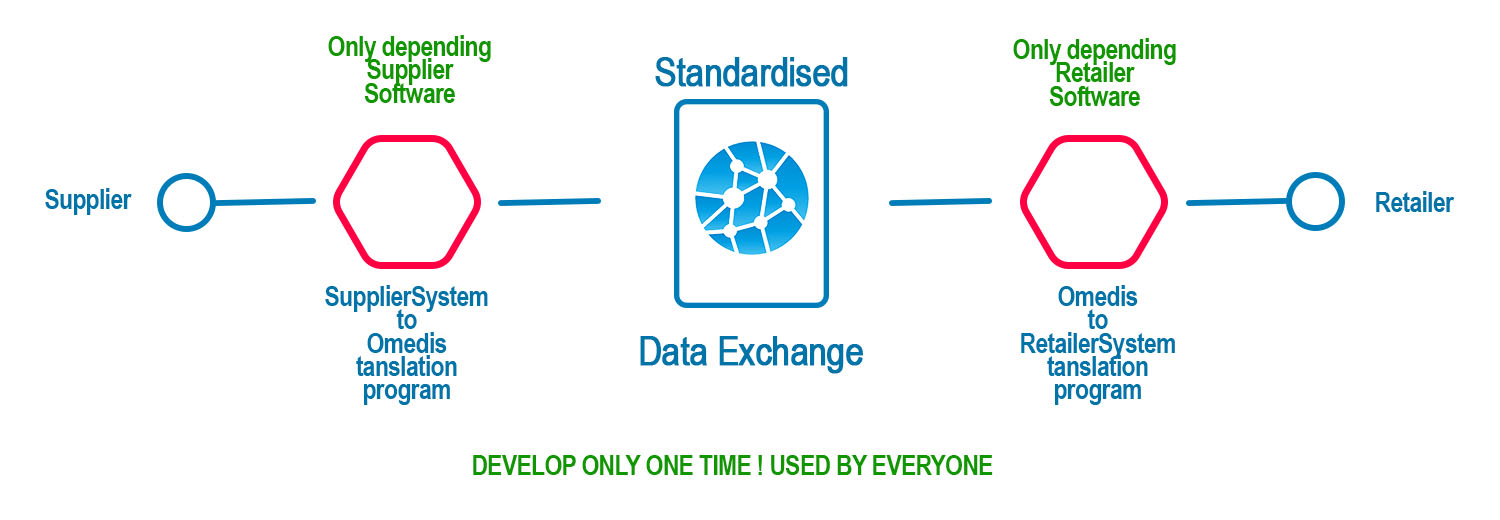Outdoor Market Electronic Data Interchange Standard

OMEDIS is defining the industry standard in Commercial Product Data Exchange between suppliers and retailers. Thanks to this standard, partners can speed up, securing and making reliable information exchanges. LET'S SPEAK THE SAME LANGAGE !
Save time, save money, increase business
- Dramatically reduce time sped for Data Entry
- Increase data reliability
- Reduce price update delay
- Enhance product visibility on e-commerce website
- Speed up business
- Increasing efficiency for both instore and online business
Spending hours in data entry has definitely no added value. By speed up and securing product data update, let's focuse on service, advice and b2c trade
What is OMEDIS ?
OMEDIS is defining like a langage for product related data exchange between brands, distributors and retailers.
This includes technical data like size or color, logistical data like weight and dimensions, business data like wholesale price or retail price,
marketing data like marketing description or pictures.
OMEDIS is stored on a collective public repository that can be updated by the community, letting everyone be aware of updates.
OMEDIS is freely accessible, and will stay free lifetime, because standardisation of exchange is a win-win feature for all partners.
What is not OMEDIS ?
OMEDIS is not a software, but only a standard definition. The current website is only the tool giving easy and free access to the standard definition.
OMEDIS does nothing, except helping partners to exchange data with efficiency by defining how to exchange data.
OMEDIS will not manage the exchange of data. This is the task of partners that can control the diffusion.
OMEDIS will not store any product related data
OMEDIS is not a goal but only a middleware
What is a standard ?
As soon as we need to process data with automatic or semi-automatic engine, we need to standardize so that IT systems can talk together.
Defining format for open data
As an exemple, let take a numerical value with decimal part, representing the retail price of one product.
We can write this value in several ways : "1245.85" or "1245,85 €" or "1 245,85€" or "1,245.85 Eur"
The standard is fixing the official way to exchange this value between two computing systems : "1245.85"
Defining key values for closed data
Let's take a string value representing the category of product for classification. Depending on company internal classification, you can find the following value :
- "Windsurf boardbag"
- "Windsurfing Board Protection"
- "windsurf-protection-boardbag"
- "Housse de flotteur de windsurf"
The standard is defining a list of possible values, that each computing systems can relate to his own internal representation.
For the current case, this will be : "watersports-windsurf-bag"
OMEDIS more in details
OMEDIS is defining
- The possible containers and organisation for data exchange (ie. csv file, excel file, xml file, api call)
- The list of possible columns in your data file, including mandatory and optional attributes (like brand name, product name, categories, prices)
- The list of datatype (Ex. String, Currency, Integer, Boolean), and the way to write them (character coding, delimiters, limits etc.)
- The list of units (Ex. Eur, Usd, Liter, Meter, Kilogram), the way to name them, and the way to use them.
- The list of available values for closed attributes (like colors, categories, brand name, etc.).
Developp One time, use Many

Thanks to this standard, each supplier has only to develop one translation program from his own ERP to OMEDIS. Each retailer has only to develop one translation program from OMEDIS to his own retail management system.
How to start with OMEDIS ?
We suggest that you start by downloading a sample CSV or XML file, so that you will clearly understand the structure of files.
Then you can have a look at the list of possible attributes for each product. For each one, you will
find the required datatype and unit.
Now it's time for you to develop a program that can export (if you are a brand) or import (if you are a retailer) data to or from your own IT system.
This program will be a sort of translator from or to you system.
Need some help ?
Tutorial for suppliers that want to create OMEDIS compliant file
Tutorial for retailers that want to use OMEDIS compliant file
What is EDI ?
EDI acronym is for Electronic Data Interchange. EDI is a technique that replaces physical exchange of documents between companies (data, orders, invoices, delivery slips, etc.) according to a standardised format. The data are structured according to referenced international technical standards (e.g. Edifact).
Why EDI for outdoor industry ?
From now on, all retailers are using an invoicing/stock management IT tool and/or an e-commerce website.
Therefore, they all need to integrate product-related business data into some computer system.
Inter-company electronic data interchange is therefore now at the heart of our daily work.
Thanks to the will for brands offering best possible product for each need, the volume of data is growing exponentially with ever-longer lists of products.
On the retailer side, integration of these data is beginning to weight significantly on the work-hours.
On top of all this time that is no more devoted to customers, manual input is a large source of errors as well.
So it is essential to rationalize these exchanges and automate as much as possible the tedious data entry tasks.










